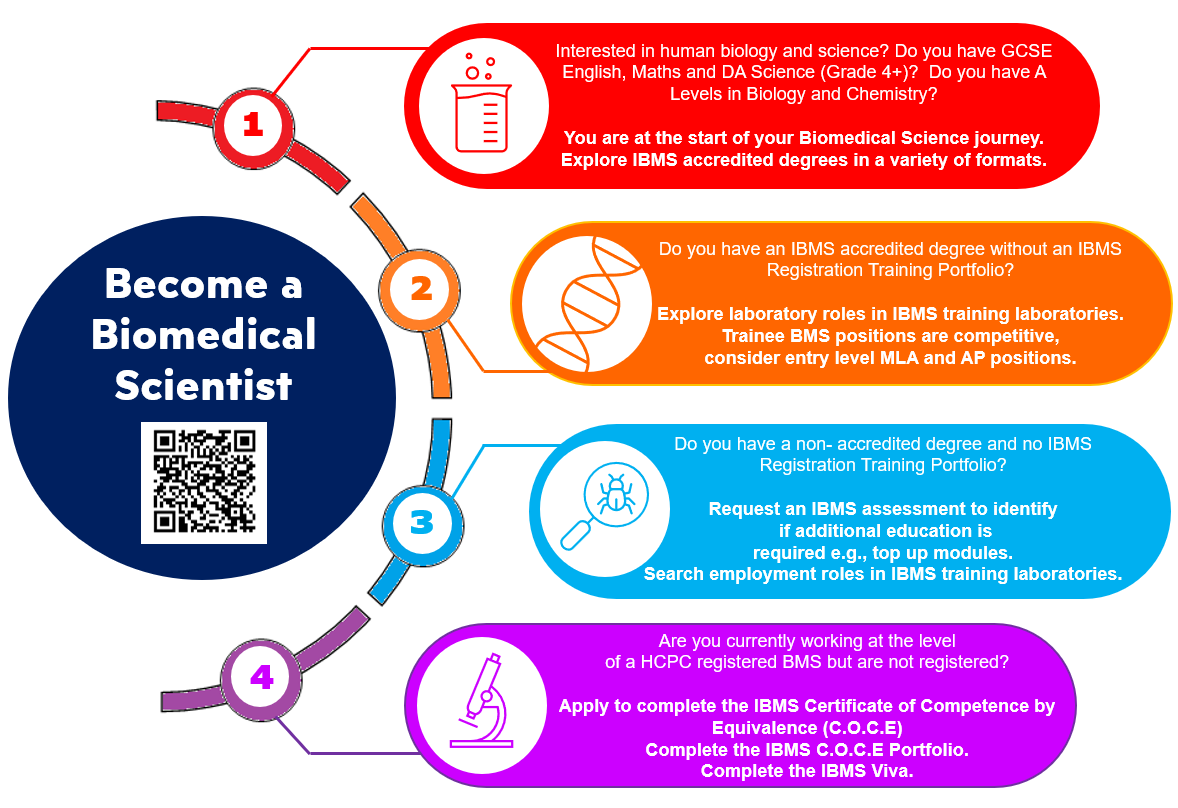Last week, Amber Haynes shared her 'day in the life' of a Biomedical Scientist working within Haematology here at The Shrewsbury and Telford Hospital NHS Trust.
So, how do you become a Biomedical Scientist?
To become a Biomedical Scientist you need to be registered with the Health and Care Professions Council (HCPC). To get to this stage you will need to complete an Institute of Biomedical Science (IBMS) approved biomedical science degree, as well as completing the IBMS Registration Training Portfolio. The latter needs to be completed in an IBMS approved training laboratory.
There are a few options to get you to this stage.
Option 1 - University degree
After school and college, you can apply to University to do a biomedical science degree. You'll need to check that the course you choose is an IBMS accredited degree*.
- complete an IBMS accredited degree with an integrated placement (the NHS Practitioner Training Programme in life sciences). This allows you to apply to the HCPC to be a registered biomedical scientist once you graduate
OR - complete an IBMS accredited degree without an integrated placement, then complete an IBMS Registration Portfolio after graduation. This is often done while working as a trainee biomedical scientist.
Typical entry requirements for this route are:
- 5 GCSEs at grades 9-4 (or equivalent) in Maths, English and Science
- 3 A Levels (or equivalent) including biology and chemistry
*If the course you have done, or are currently doing, is not accredited by the IBMS, you can request an IBMS assessment which will identify if you need to complete any top up modules before proceeding. More information can be found in the infographic further down in this post.
Option 2 - Apprenticeship
You may choose to get into this field by doing an apprenticeship, for example:
- Biomedical Scientist Level 6 degree apprenticeship
- Healthcare Science Practitioner Level 6 degree apprenticeship
This route gives an insight into the role and you'll gain hands on experience whilst studying towards your qualification. Since you'll be working towards a degree in these apprenticeships, they usually take at least 3 years to complete.
Typical entry requirements for a higher or degree apprenticeship are:
- 4 or 5 GCSEs at grades 9-4
- A Levels or equivalent
Option 3 - Work based training
You may be able to get into Biomedical Science in an entry level position, for example, as a Medical Laboratory Assistant. For these roles you typically need GCSEs, and there may be the opportunity for further training and development (including apprenticeships as mentioned above) available to you once you start in post.
The infographic below highlights the 4 stages you may be at in starting your career in Biomedical Science.
1. No degree, but completed GCSEs in Maths, English and Science, and A Levels in Biology and Chemistry. You can explore undertaking an IBMS accredited degree in Biomedical Science.
2. You have an IBMS degree, but no IBMS registration training portfolio. You can explore laboratory roles in IBMS training laboratories. A trainee BMS role would be suitable, however these are very competitive, so you may wish to consider entry level roles such as a Medical Laboratory Assistant or Associate Practitioner.
3. You have a non-accredited degree and no IBMS registration training portfolio. You can request an IBMS assessment which will identify if you need to complete any top up modules before proceeding.
4. If you are currently working at the level of a BMS but are not HCPC registered, you can complete the IBMS Certificate of Competence by Equivalence, portfolio and Viva.
There are some useful resources available online to help guide you in your career path to becoming a Biomedical Scientist.
- Becoming a Biomedical Scientist page on the IBMS website (you can also access this page by scanning the QR code in the image above)
- Biomedical Science page on NHS Health Careers website
- How to become a Healthcare Science professional on NHS Health Careers website
Before you go, we also asked Amber for her top tips on getting into this field:
Amber's Top Tips on becoming a Biomedical Scientist
- If you wish to pursue a career in Biomedical Science, complete an IBMS accredited Biomedical/Healthcare Science degree. A list of institutions offering accredited courses can be found on the IBMS website.
- Attend a careers event if you see Pathology listed and come and have a chat to one of the team about the role.
- Look into/apply for entry level roles such as Medical Laboratory Assistant (MLA). This role is where I started and gives you great foundational scientific and operational knowledge.
- Look into volunteering opportunities within the Trust, we currently have several volunteers working within Blood Sciences who help facilitate the smooth running of the laboratory.
- Ask questions, send emails and research the different fields. We are a very welcoming group of people who are happy to spread the word about Pathology and what we do
To see all our current vacancies within Biomedical Science, please visit our Healthcare Scientists jobs page.

